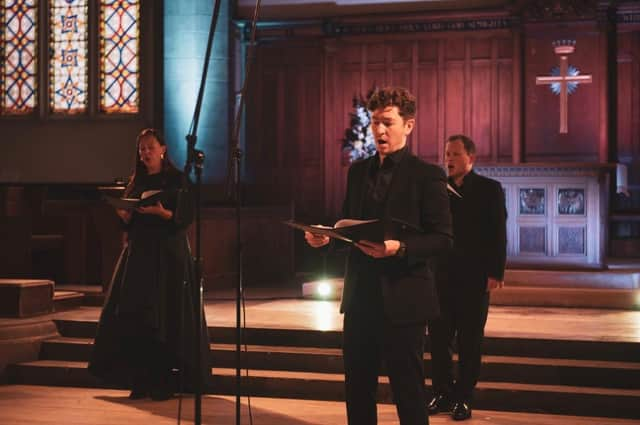Music reviews: The Dunedin Consort | The Scottish Ensemble | VOPERA


Of all the online classical offerings available during our Covid times, there’s something especially powerful about those featuring the voice. Perhaps it’s the deep, direct form of human expression, unmediated by an instrument, that packs such a punch. Then again, there’s also the awareness of just how risky vocal projection can be.
Not that there was any suggestion of danger among the clearly distanced 12-strong choir of the Dunedin Consort in How Lonely Sits the City (*****), captured beautifully on video in Greyfriars Kirk by Leith-based Arms & Legs productions. The concert’s themes – of loneliness, isolation, the empty streets of an abandoned city – were dreamt up before the pandemic, but of course feel all the more immediate now.
Advertisement
Hide AdAdvertisement
Hide AdIt’s a cathartic experience, one that faces down our current challenges, and transcends them, too, in impeccable, gloriously expressive performances. Conductor Nicholas Mulroy – recently appointed as Dunedin’s Associate Director – seems to have a miraculous gift of conjuring highly distinctive, individual sound worlds for each of the concert’s contrasting pieces – beautifully luminous and supple for the Lassus Lamentations that frame the performance; warm and resonant for Rudolf Mauersberger’s Brahmsian Wie liegt die Stadt so wüste; fiery and chiselled for James MacMillan’s powerful Miserere.
The concert’s newest piece – Ninfea Cruttwell-Reade’s Vigil I, commissioned by Dunedin specially for the event – is also its high point. Cruttwell-Reade shifts focus between different quartets of singers, different harmonies, even different languages, creating a perpetually engrossing soundscape and astonishingly rich writing that rings in the ears long after the piece has ended. Available free online at www.dunedin-consort.org.uk until 18 December, this is a considered, thoughtful concert, captured in CD-quality sound, that feels consoling and inspiring in equal measure.
The Scottish Ensemble – which has just deservedly won the Royal Philharmonic Society’s 2020 Ensemble award – took a more secular approach to similar ideas in Songs for Life (www.scottishensemble.co.uk/concert/songs-for-life-with-karen-cargill), a collaboration with mezzo-soprano Karen Cargill (****). Filmed by Miranda Stern in Glasgow’s Cottiers Theatre, it butts up an eclectic, sometimes provocative selection of pieces against each other, from a brilliantly energetic movement from Walton’s Sonata for String Orchestra to the warmth and richness of George Walker’s Lyric for Strings. Cargill is on exceptional form, responding to the concert’s range of music with disarming simplicity and sincerity – she offers some beautifully supple, buoyant Mahler, a quietly harrowing Dido’s Lament, and a very moving Auld Lang Syne to finish. Video and audio aren’t always entirely in sync – caused by combining different takes for film and recorded sound, it appears – but nonetheless, it’s a typically bold offering, thoughtfully delivered.
Cargill makes a return appearance as a tender Maman (one of a clutch of Scottish singers that also includes Shuna Scott Sendall as a yoga-teaching cat) in a breathtaking online production of Ravel’s one-act opera L’enfant et les sortilèges (*****) from newly established company VOPERA, the Virtual Opera Project (www.vopera20.com), free to view until 15 December. Brilliantly conceived by director Rachael Hewer and designer Leanne Vandenbussche, VOPERA’s astonishing, sometimes hallucinatory vision of Ravel’s fairy-tale parable finds a heartbreaking home for its cast of animals, furniture and household objects among images only too familiar to us: a storybook princess becomes a nurse in full PPE; a frog chorus meets via Zoom; a dragonfly and bat are isolated behind glass in a care home.
The story behind the production is remarkable enough: it was created from scratch under the severest lockdown conditions, each part recorded separately in the soloists’ own homes, then stitched together with phantasmagorical animations, and a new reduced orchestration created by conductor Lee Reynolds, played stylishly by the London Philharmonic Orchestra.
Technically the results are extraordinary, but creatively this is quite simply a masterpiece, one of the most assured, ambitious and deeply moving projects to have emerged from lockdown, and one that’s determined to see lockdown limitations as creative opportunities. If you can make it through the images of ghost lights and empty auditoriums that accompany the opera’s choral conclusion without reaching for a hankie – well, you’re made of stronger stuff than I am.
A message from the Editor:
Thank you for reading this story on our website. While I have your attention, I also have an important request to make of you.
Advertisement
Hide AdAdvertisement
Hide AdThe dramatic events of 2020 are having a major impact on many of our advertisers - and consequently the revenue we receive. We are now more reliant than ever on you taking out a digital subscription to support our journalism.
To subscribe to scotsman.com and enjoy unlimited access to Scottish news and information online and on our app, visit https://www.scotsman.com/subscriptions
Joy Yates, Editorial Director